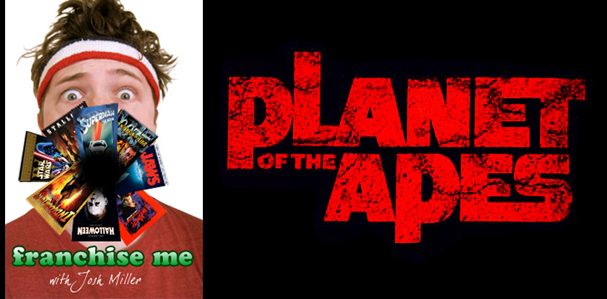
Hollywood loves a good franchise. The movie-going public does too. Horror, action, comedy, sci-fi, western, no genre is safe. And any film, no matter how seemingly stand-alone, conclusive, or inappropriate to sequel, could generate an expansive franchise. They are legion. We are surrounded. But a champion has risen from the rabble to defend us. Me. I have donned my sweats and taken up cinema’s gauntlet. Don’t try this at home. I am a professional.
Let’s be buddies on the Facebookz!
The Franchise: Planet of the Apes — chronicling the epic and turbulent history of a civilization of evolutionary advanced apes – particularly the bloodline of two chimps, Zira and Cornelius – and their relationships with humankind. The franchise spawned from Pierre Boulle’s 1963 novel La Planète des singes, and spans five original-series films, a theatrical remake, two television series, and a new prequel-re-boot hitting theaters August 5.
previous installments:
Planet of the Apes
Beneath the Planet of the Apes
Escape From the Planet of the Apes
Conquest of the Planet of the Apes
Battle For the Planet of the Apes
The Installment: Planet of the Apes (September 13, 1974 – December 20, 1974)
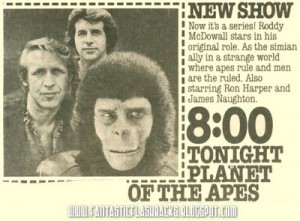
The Story: Effectively rebooting the concept of the series, three astronauts – Colonel Alan Virdon (Ron Harper) and Major Peter Burke (James Naughton), plus another dude who dies immediately – accidentally enter a time warp while space-cruising to Alpha Centauri and crash their ship on an ape-ruled future Earth. Luckily for them, in the Apes universe clocks and watches defy the laws of physics and can somehow nonsensically record the passage of time through space-time anomalies, so they learn that they are in the year 3085. In this version of the Apes world, humans can speak and are fairly intelligent, but live in subjugation of the apes, who view them as mentally inferior. Long story short, Virdon and Burke get captured by the apes. Dr. Zaius (Booth Colman) wants to interrogate them. General Urko (Mark Lenard) wants to kill them. They befriend a chimp named Galen (Roddy McDowall), who becomes disillusioned by the knowledge that humans once ruled the world, and helps Virdon and Burke escape. Now the three are on the run, pursued by Urko, and every week they have a new crazy adventure helping others and making friends (both human and ape) along the way.
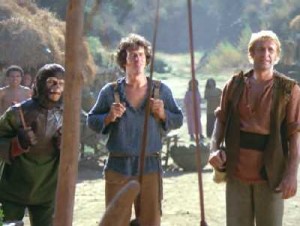
What Works:
Battle for the Planet of the Apes gets crap for looking like a TV show. The upside of that for the franchise, I suppose, is it allowed Planet of the Apes the series to look like an acceptable extension of the films, and not some embarrassing bed-shit in quality. The make-up remains on par with the films, and frankly a lot of the sets and locations look better than what we just got in Battle.
This is not a particularly great TV show, but you know what? It’s not terrible either. Sure, in the grand quality spectrum of TV series based on films, it is much closer to Ferris Bueller or Dirty Dancing than Buffy the Vampire Slayer or M*A*S*H, but it is a worthy enough effort. Certainly this is where you will discover just how into the Apes franchise you are — I would liken it to the Alien Nation, Highlander or Terminator TV series in this regard. Fans who most connected to the maturer qualities and big stories of the Apes films will most likely find the show incredibly lame. There are no devastatingly fucked up endings to these episodes, and there is much duller political or social commentary. The show is squarely aimed at those who just really dug seeing the apes do their ape “thang.” This is Planet of the Apes Lite. But if I had been a kid when this show was on, I would have watched it, much in the same way I watched Hercules: The Legendary Journies or anything other so-so yet amiable genre show. Does it have dudes in ape make-up enslaving humans? Sold.
I think it was a smart move to just reboot the concept on the show, instead of trying to make it a continuation of the films — which actually seems like a natural idea given Roddy McDowall’s continued involvement. It is peculiar that the film is set in the year 3085 instead of 3978 (like the original Apes), yet Dr. Zaius is a character. But that doesn’t really matter; more so it’s just curious that they even changed it. In the pilot Zaius refers to previous astronauts who crashed on the planet, which could be inferred as references to Taylor or Brent, though that wouldn’t exactly make any sense considering the entire planet was blown up. Plus on the series the ape civilization in located where San Francisco used to be, instead of New York. Point being, the show is its own thing. The humans can talk and they wear normal clothes and live in houses, which is a wise departure, as I can’t imagine how the show would’ve been at all watchable if every episode featured Virdon and Burke interacting with feral mutes.
Given that it was functioning on a presumably modest budget, the show has rather excellent production design. In “The Trap,” our characters enter the demolished ruins of a city, and though they’re obviously on a studio backlot, the destruction and post-apoc mess is on the money. I also spotted the amphitheater featured in Beneath recycled here as a gladiatorial ring.
As someone who was sad to see the ape civilization given the short shrift in Beneath, and then completely abandoned until Battle, I enjoyed seeing the world expanded. For one thing, I like how big this ape world is. While it worked effectively in Apes, it never made a ton of sense why the ape civilization was so small. Now we have a central ape city, with small villages and communities scattered across the countryside, each with its own laws and attitudes. General Urko isn’t a great character (he’s no General Ursus), but I do like how quickly into the series he learns the truth about Earth’s past — there is a good dramatic moment where he sees a painting of a human child offering a caged gorilla a banana at the zoo. Urko is then driven more out of rage and spite than misinformation or fear, which makes him most interesting and unlikable. And the first handful of episodes – with an evolving plotline anchored by General Urko’s pursuit of our heroes – have a good energy to them, but…
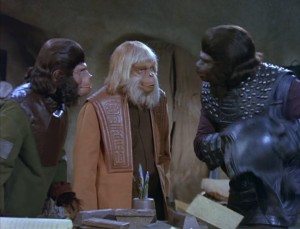
What Doesn’t Work:
…as the series goes on and settles into its routine it gets a bit boring. The main antagonistic focus of each episode ceases to be Urko’s pursuit, and Urko becomes merely a reoccurring character. The stories get monotonous as our trio hops from community to community and essentially the same thing keeps happening. Basically every episode features one of two arcs:
1) Burke, Virdon and Galen help some apes who learn that maybe they’ve been wrong about humans.
2) Burke, Virdon and Galen help some humans who learn that maybe they’ve been wrong about themselves.
Roddy McDowall is bizarrely wasted as Galen, who isn’t as interesting as Cornelius or Caesar. I’m not sure why they have Dr. Zaius, but felt they shouldn’t have Cornelius — it is also funny that in that ad up top they say that McDowall “stars in his original role.” Clearly the marketing department was savvier than the people creating the show. In any case, Galen just sorta sucks and feels rather peripheral, considering he is one of the three leads. Part of the problem is that on the show apes are kind of stupid. I’m not really sure how they successfully subjugated the humans, actually. Each episode generally features Virdon or Burke teaching the stupid apes some of their fancy past knowledge, like how to plow a field or use a net to catch fish. Apes are also afraid of the ocean, which makes them seem extra idiotic. While this is tonally in keeping with Taylor’s relationship with the apes in Apes, repeated episode after episode, the apes stop feeling like much of a threat, and Galen is just Virdon and Burke’s goony side-kick who is usually wrong about all his assumptions. There is nothing wrong with that, it is just strange that the part is played by Roddy McDowall, who you would assume would’ve warranted an awesomer character.
The show doesn’t always feel entirely well thought out, as far as its own mythology is concerned. Like, why do apes raise chickens and cows? I guess they’re vegetarians now instead of herbivores, although I don’t recall seeing any apes eating bread or anything they’d need milk or eggs for. The intelligence level of humans on the show is inconsistent too, and I was never entirely able to grasp if these humans have slightly devolved (maybe on their way to becoming feral mutes) or if the show was painting them like African-American slaves, who were mentally equal to whites but simply treated as inferior (I have to presume it is the latter).
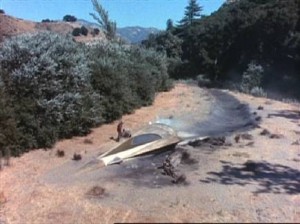
Best Guest Star Appearance: Future master of beasts Marc Singer and future father of Conan the Barbarian William Smith play father and son in the episode “The Gladiators.”
Best Inverted Reality Line: While talking with Galen about human intelligence, Prefect Barlow says, “Put them in a room with plenty of pots of color and brushes, give them enough time and eventually they’ll duplicate every masterpiece ever painted.”
Stupidest Hero Moment: In the pilot, when our heroes encounter their first human, they ask him “What planet is this?” Maybe it’s just me, but if my spaceship encountered a space anomaly and I got lost and crashed on a planet, and then I met a human being who spoke English with a North American accent, I’d have a pretty good guess what planet I’m on. Like I said though, maybe it’s just me.
Should It Have Been Canceled: No. Perfectly acceptable young-skewing genre TV good times. Although it seems like the premise could not have been stretched out reasonably for more than two or three seasons.
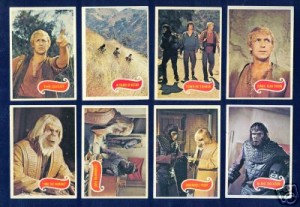
Up Next: Return to the Planet of the Apes (TV series)
previous franchises battled
Leprechaun
Tremors
Critters
Death Wish
Police Academy
Phantasm